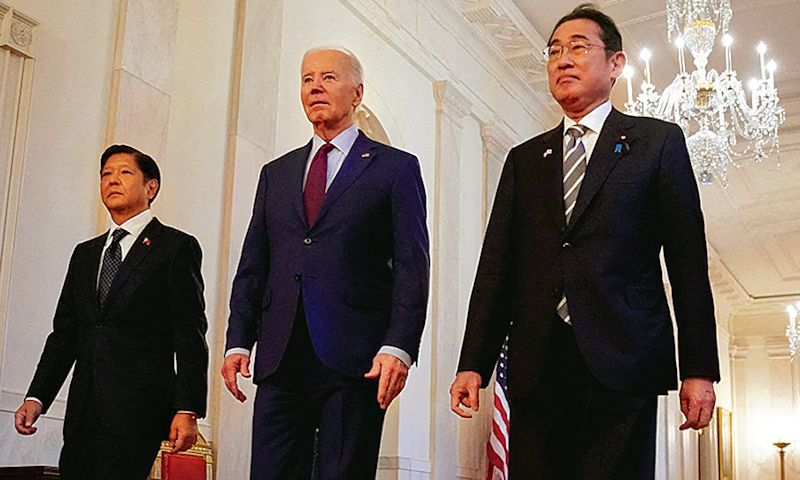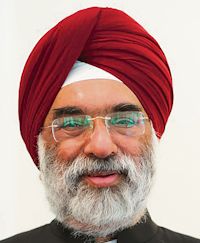US-Japan rapport has strategic, economic lessons for India
- May 28, 2024
- Posted by: admin
- Categories: Japan, USA

Biden and Kishida indicated that they were prepared to challenge China’s unrelenting, aggressive intent in the Indo-Pacific.


Gurjit Singh
Former Ambassador
Both the US and Japan will go to the polls over the next 18 months or so. Nevertheless, US President Joe Biden and Japan’s Prime Minister Fumio Kishida found time for a summit in Washington earlier this month. The summit focused on strengthening and enunciating forcefully that the two nations are united strategically and economically.
Biden and Kishida asserted that the US-Japan partnership was prepared to challenge China’s unrelenting, aggressive intent in the Indo-Pacific. The emphasis was on securing themselves and their friends from Beijing’s economic and strategic coercion by offering alternatives for the region to engage with, including resilient supply chains.
Japanese media thinks that a key takeaway from this summit is a recognition by Washington that Tokyo is now a global player and not confined to its own region. Hence, both promised, through the Indo-Pacific Economic Framework and beyond, to assert shared economic growth, with investments flowing in both directions. Therefore, their collaboration was projected as indispensable for appropriately responding to the Chinese economic coercion and strategic threats and the weak links in supply chains, with the bigger aim of global economic growth.
Biden is facing a tough election in November, while Kishida is experiencing political tremors due to his party’s plummeting popularity. However, they are keen on sustained compatibility and a stable partnership even if the elections in both countries lead to a changing of the guard.
Kishida held talks with Biden, addressed Congress and met business leaders. Kishida conveyed to Congress the message that Japan remained the warmest friend of the US and they stood hand in hand to defend their values. Undoubtedly, the Chinese threats emanating from the Ukraine and West Asian crises dominated the summit.
The address to Congress was more of a reassertion of the bilateral partnership. Economic resilience was factored in the business meeting. Kishida met Tim Cook of Apple, Jeff Bezos of Amazon and David McCall, president of the United Steelworkers International, at the state dinner. Nearly 70 announcements were made of new business efforts which are seen as significant deliverables. Now, Japan is more than willing to have a common defence mechanism, with the US playing a bigger role. The US military command structure in Japan will be revitalised, and defence technology will become a more important part of the US-Japan partnership. A boost to artificial intelligence (AI) and related research is now an integral part of the scheme of things. Microsoft is likely to invest $3 billion in AI-related infrastructure in Japan by 2025. Amazon and Nvidia are likely to support another AI-led programme between the universities of Tsukuba and Washington. The Japanese technology of Shinkansen (the bullet train) is likely to be a part of the Texas Central High Speed Rail Project, which can reduce the travel time between Dallas and Houston.
A commercial basis of fusion energy was announced. Japanese and US institutions will work on this to jointly contribute to the alleviation of climate change. Japan is at present the largest provider of FDI in the US and a major employer. This was highlighted by Biden at the meeting where representatives of many Japanese-American companies were present. Kishida, who realises the value of the Japanese FDI overseas as a diplomatic tool, promised that this would only increase in the US in the near term.
Kishida’s speech to Congress was evocatively titled ‘For the future, our global partnership’. He is only the second Japanese PM after Shinzo Abe to be given this privilege and he used it to raise Japan’s stature. Talking about the changed geopolitical scenario, he said: “As Japan grew in confidence, we expanded our outlook beyond that of being America’s closest ally. We first became a regional partner and now we have become your global partner.” Kishida’s success in transforming Japan’s national security strategy, increasing the defence spending to 2 per cent of the GDP and acquiring counter-strike capacities make him a more valued partner rather than a junior ally to the US.
Hinting that the US could revert to the America First policy, Kishida told Congress that Japan was more than prepared to take on its own share of the burden — which so far the US has shouldered — in keeping the global order free and open. His message is that the US should continue to engage with the Indo-Pacific in which Japan will play its role alone, without leaning on the US. This implies that Japan would be ready to shoulder responsibilities brought in by the US, for instance, in defence of Taiwan and the Philippines.
Speaking about China, North Korea and Russia and the challenges that they pose to the global order, he said China’s actions were unprecedented and the greatest strategic challenge to the peace and stability of the international community, for the sake of which Japan was ready to play a key role.
Kishida was Biden’s fifth state guest during his term. Among the Quad partners, Australia and India have already been hosted, along with South Korea and France. It is clear that the US and Japan are working to build a stronger partnership in technology, FDI and their common interests in the Indo-Pacific and Southeast Asia. Both see the Kishida-Biden meeting as the validation of their respective Indo-Pacific strategies. With the South Korea-Japan-US relationship also steady now, the force structure of the US in Japan will become more integrated into a joint operation centre. A new military industrial council would evaluate the co-production of defence equipment, where Japan’s industrial capacity and technology will come to the forefront and match the US in strategic applications. Five space agreements over the years will bring them closer in space exploration as well.
The Japan-US partnership is going global, hoping to insulate itself from domestic political turmoil. India would do well to integrate itself with this approach.
